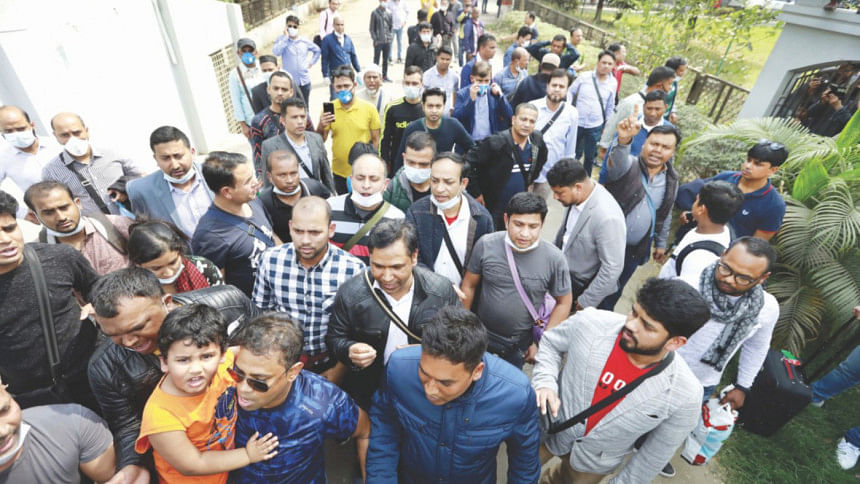Complacency, not panic, is the real danger

The World Health Organization (WHO) has declared the spread of coronavirus a global pandemic. Over 14,000 people have died and nearly 350,000 have been infected, although there is uncertainty about the numbers as many of those infected may not show symptoms. Also, many countries are not testing aggressively and may be hiding the real figures. Nevertheless, coronavirus infections have been increasing worldwide, doubling in some countries overnight, although China and South Korea claim to have arrested its spread.
Panic appears to be engulfing humanity, especially since this is a new type of virus against which we are not immune and which cannot be treated with antibiotics. More importantly, there are no working vaccines against coronavirus yet, although scientists are frantically at work on one. While leading scientists have said it will take up to 18 months for clinical trials and safety approvals, arresting the spread of the virus will require vaccinating 45 to 70 percent of the world's population, which may take several years. Thus, we cannot expect that the coronavirus crisis will go away soon.
Another reason for the panic is the way coronavirus works. The virus enters the body through the eyes, mouth and nose, infecting and hijacking the cells your body is made of. While for a lot of people the infection will not become serious and manifest as mild respiratory problems, the fact that it is highly contagious has created mass panic across the world. In the worst case situations, people with severe respiratory problems are being put on ventilators, without which they will die.
However, the tendency to deny the seriousness of the virus' spread, which we have seen globally, is probably the greatest danger we are facing now. Even when its spread turned serious and a dead body was seen lying on the street of China's Wuhan province in late January, we felt that the problem belonged to a distant land and would not affect us. When the virus started spreading in our neighbouring countries, we were also in denial. That is the reason why the Italian authorities and the US President took no serious actions against the spread of coronavirus, rather claiming that everything was under control.
But the situation has started to take a turn for the worse. Experts are now predicting that 40 to 60 percent of Americans may get infected. A study by the Imperial College in UK found that the spread of coronavirus, if not contained, could kill as many as 2.2 million Americans and over 500,000 Britons. German Chancellor Angela Merkel warned that 70 percent of Germans will be infected by the coronavirus. Such spread could cause a worldwide humanitarian disaster of unprecedented proportions.
Bangladesh is under greater risk. The reasons include our high population density, the return of our expatriate workers from countries where coronavirus has already spread, our relatively poor health infrastructure (limited hospital beds, ventilators, ICUs etc.), limited supply of diagnostic kits and protective gear for health professionals, and widespread lack of awareness about the virus and how it is spread. We can see the result in the negligent treatment this week of a 24-year old college student who recently returned from Canada. She died due to neglect and prejudice, even though she was not infected by coronavirus. In addition, only a handful of the many Bangladeshis who recently returned from abroad are under quarantine.
Coronavirus is not only threatening lives, but also the livelihoods of millions of people worldwide. Global stock markets and shares have plunged and leading economists have spoken of how the coronavirus crisis is pushing the world economy into a deep recession. In the meantime, the activities of many service sector industries—including airlines, hotels and restaurants—have come to a standstill.
All rich countries have already taken important steps to prevent their economies from nosediving. France, for example, has gone on a war-footing to combat the emergency created by the unprecedented spread of coronavirus. The US government is contemplating a package of assistance amounting to over a billion US dollars to assist its citizens and bailout businesses. The British government has also planned to spend 330 billion pounds in similar assistance. Other countries, rich and poor, are trying to mobilise resources for similar aid packages.
In Bangladesh, we are at serious risk, but our preparations appear to be grossly inadequate. We are afraid that many Bangladeshis, irrespective of their political affiliations, will lose their lives. Our economy will also face a catastrophic nosedive. Due to coronavirus, already readymade garments orders worth USD 1.5 billion have been cancelled or postponed. Many garment factories may go bankrupt, sparking mass unemployment. It is predicted that about 500,000 people associated with the travel and tourism industries may lose their jobs. All our economic indicators, except for remittances, are already on a downward trend. With the return of many overseas workers because of the worldwide economic decline, this will not only accelerate corona related deaths, but may also trigger a disastrous decline in remittances. With declines in remittance, coupled with big borrowers who may default on their loans due to the global economic downturn, our banking sector may take a ruinous plunge.
Clearly, our economy is in serious danger. We have already faced monumental challenges such as plundering due to corruption and cronyism, as well as poisonous confrontational politics. Now, we are afraid that this health-related disaster could throw us into an abyss, if not addressed immediately. We ask the government to declare a nationwide lockdown to stop further spread of the infection, and put into place a stimulus package to prevent potential economic meltdown.
When the alarm is sounded on the eve of a calamity, it is easy to dismiss it as an overreaction. In hindsight, however, complacency, not panic, is often the real danger. With a potential catastrophe on the horizon, we must also be on the side of caution. We hope that our government will show courage and wisdom in taking the audacious steps necessary to address the impending danger.
Dr Badiul Alam Majumdar is Secretary at SHUJAN: Citizens for Good Governance.

 For all latest news, follow The Daily Star's Google News channel.
For all latest news, follow The Daily Star's Google News channel. 



Comments